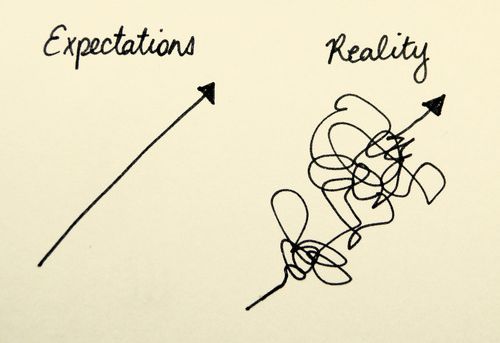Expectations are Premeditated Resentment

If you have hung around any 12 step rooms you will probably recognize the title of this article. 12 step groups are treasure troves of wisdom that has been distilled into pithy sayings and mantras that get repeated again and again throughout the community. These very pedestrian statement often contain tremendous power, wisdom, and potential healing. This phrase "Expectations are premeditated resentment" is an incredible example.

It's probably best to begin by addressing resentment and making sure that we are all on the same page about it's destructive and corrosive nature. Resentment is a complex mixture of anger, disgust, disappointment, hostility and often fear that is directed toward an object that one identifies as 'the cause' of their frustration. A quick survey of the antonyms listed on dictionary.com does a good job illustrating the cost of allowing resentment to take hold. Beyond the loss of calmness, love, joy, kindness, good will, and the rest of what is listed above, we might add the hypothesis that resentment is the opposite of forgiveness. It has come to be synonymous with spite and holding a grudge.
When one enters recovery, they have a well worn path marked out for them that is represented by the 12 steps. The first three steps, while no small feat have everything to do with acknowledging that one has a problem, needs help, and surrendering to a power greater than themselves to restore sanity. Then comes step 4, which is known as a 'searching and fearless moral inventory'. This crucial step has one dig into their past to uncover and take ownership of and responsibility for their own feelings and behaviors. Among the many painful, embarrassing, and difficult things that this step will have one address, is their resentments. What people, places, or institutions do you resent and why? Here though, in the depths of step 4 introspection, the question has nothing to do with explaining what others may or may not have done to 'cause' your resentment. This is an exercise in taking responsibility and thus points one to find what their own resentments might reveal about themselves.
Resentment can, in extreme cases, cost us everything. It is, according to recovery wisdom, among the things feeding the roots of our addictions and compulsions. It is, according to dictionary.com, the opposite of happiness and joy. Hopefully this has been sufficient enough of a quick survey of resentment to illustrate it's corrosive and undesirable nature. Resentment is, as much as it depends on us, something to avoid.
So what about expectations?
Our expectations typically pertain to people and things that are outside of ourselves. While it might be reasonable to expect someone to show up at a location at the time that they said they would, we tend treat all of our expectations as if they were this normal and reasonable, even when this might not be the case. Often, when we are frustrated, or suffering in some way, we look outside ourselves for a cause. Whether it is a selfish spouse, a cruel boss, or a demanding friend, we attribute blame and sometimes miss the fact that it is our expectations that might be at the heart of our problem. For some reason, we feel that we have every right for external reality to map to our internal demands on it. We feel as if our expectations are healthy and normal: "Of course my spouse should stop what they are doing and greet me when I come in", "of course you should offer me something to drink when I visit", "of course my girlfriend should answer my test messages in a timely fashion, of course my dad should care about x,y, or z, of course, of course, of course. While many of those things might be quite ordinary, we have no right to expect others to live up to our expectations, or to demand that life conforms to our ideals.
The danger is that we often don't realize how many unspoken expectations we actually have. "Why have I done all of this work and nobody noticed?", "I went out of my way to do something for you and you didn't even say thank you", "I cooked my spouse a beautiful and romantic meal, and they came home and said 'I had a really bad day today. I just want to shower and lay down.' How dare they!"
Pay attention to the expectations you are placing on yourself and those around you. They are a common and dangerous path towards being filled with that resentment that robs us of joy, good will, calmness, and in many cases, even our sanity.
Practice letting go of the expectations you have on your neighbors and do your best to just be a good one yourself. Until next time, be pedestrian.
